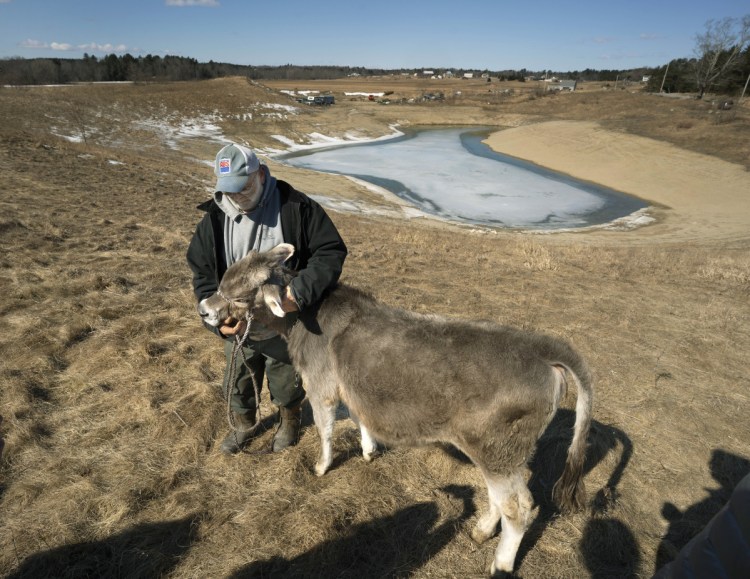State environmental regulators announced Friday that all sludge will have to be tested for the presence of an industrial chemical before being used as fertilizer or applied to land.
The Maine Department of Environmental Protection announced the new testing requirement in response to growing concerns about contamination from PFAS, a group of chemicals widely used to create non-stick coatings on cookware, food packaging and fabrics, as well as in firefighting foam. An Arundel dairy farmer has blamed PFAS contamination on his farm on the treated municipal sludge he used to fertilize his hay fields for years.
The per- and polyfluoroalkyl chemicals collectively known as PFAS degrade slowly and linger in the environment for long periods, leading critics to dub them “forever chemicals.” The subject of increasing scrutiny, some PFAS have been linked to cancer, liver damage, low birth weight and other health concerns.
“The Maine Department of Environmental Protection is committed to addressing the issue of PFAS contamination in Maine and has been working to proactively identify areas of potential concern,” DEP Commissioner Jerry Reid said in a statement. “The department is moving forward with the additional testing requirement to ensure that any future land applications of sludge are safe.”
Gov. Janet Mills had earlier announced the creation of a task force to examine the extent of PFAS contamination in Maine and recommend options for cleaning up and regulating the chemicals.
Treated municipal sludge – also known as “biosolids” – has been used as fertilizer in Maine and across the country for decades. More than 30 wastewater treatment facilities in Maine are licensed to produce sludge for land application, and there are now 66 sites statewide where sludge is allowed to be spread. Some facilities also make treated sludge available to the public in compost.
Treatment plants are required to analyze sludge periodically for roughly two dozen components, including for the presence of harmful pathogens and contaminants such as mercury, lead and arsenic. But the state has never required testing for PFAS, which have been used in manufacturing since the 1940s.
A DEP memorandum sent Friday to sludge producers directs facilities to test sludge and compost for three types of PFAS and prohibits land application if the results exceed concentrations adopted by the department last year.
The move drew praise from groups that have been urging the department to act more aggressively to regulate PFAS. Patrick MacRoy, deputy director of the Maine-based Environmental Health Strategy Center, called the testing a “wonderful” next step.
“One of the things we asked for is that any continued sludge spreading is safe, so we are very excited that they are moving forward with this,” MacRoy said. “And it’s well-timed as we head into the spring planting season. Obviously we want to see the existing fields tested … and to test (farm) products, too.”
Earlier this week, MacRoy joined other public health advocates at the Arundel dairy farm of Fred and Laura Stone to call attention to what they said were potential risks posed by PFAS in sludge.
Stone applied sludge from the Kennebunk and/or Ogunquit treatment plants to his hayfields from the mid-1980s until 2004 and spread sludge or ash waste from a paper mill to the fields for a few years in the early-1980s. All of the applications were licensed by the DEP.
In 2016, officials at Kennebunkport, Kennebunk and Wells Water District alerted the Stones to the presence of elevated PFAS levels in a water district well located on their farm. Subsequent testing revealed high levels of the chemical in the farm’s soil, water and milk. More than two years later, Fred Stone said he is still forced to discard all of his cows’ milk daily – despite the installation of a $20,000 water filter – because of lingering contamination.
“The toxic chemicals that I never used and had never even known about until two years ago contaminated my cows … and ruined my farming operation and hurt my family,” Stone said on Tuesday. “I want the state of Maine to make sure that no other farming families have to go through what’s happening to us. Believe me, I would not wish this on my worst enemies.”
While DEP investigators were unable to pinpoint a specific cause of the contamination because of the multiple sources over two decades, Friday’s memo cites Stoneridge Farm in laying out the testing requirement.
“The department sampled drinking water, groundwater, surface water, soil, manure, hay, feed and milk at this farm,” the memo states. “Although not conclusive, results of this testing indicate that the land application of wastewater treatment plant sludge/biosolids may have contributed to the contamination of this farm with PFAS compounds.”
The Stones filed a lawsuit in December in Superior Court against the Kennebunk and Ogunquit treatment plants and against several manufacturers of the chemicals. Fred Stone said during a Tuesday news conference at his 100-acre farm, which has been in his family for more than a century, is “ruined” because of the contamination and the financial strain of not being able to sell his milk.
Kevin Miller can be contacted at 791-6312 or at:
Send questions/comments to the editors.




Comments are no longer available on this story